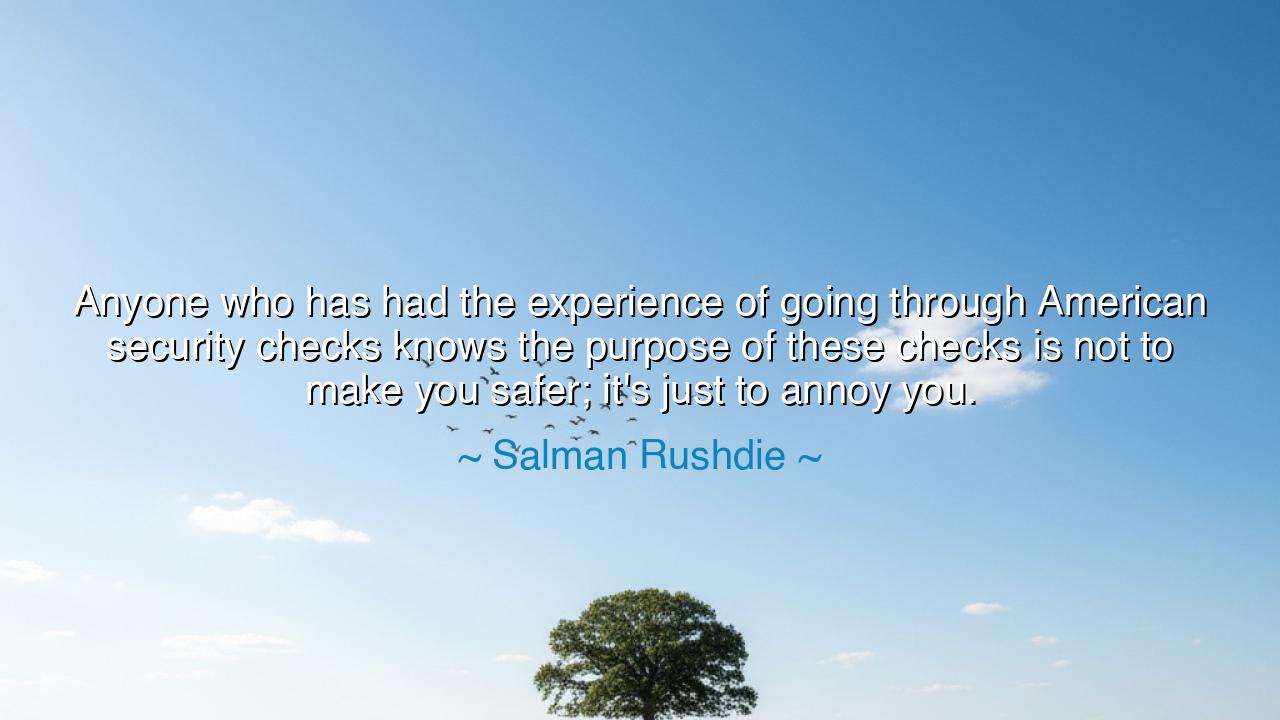
Anyone who has had the experience of going through American
Anyone who has had the experience of going through American security checks knows the purpose of these checks is not to make you safer; it's just to annoy you.






Host: The room was quiet, the soft light from the lamp casting a warm, comfortable glow across the table. Outside, the world had quieted, and the peaceful rhythm of the evening filled the air. Jeeny sat at the table, her fingers lightly tracing the rim of her cup, reflecting on the quote she had just read. Jack, standing near the window, gazed out into the darkened world, absorbed in thought. The atmosphere between them was calm, but there was an unspoken understanding that a deeper conversation was about to unfold.
Jeeny: (breaking the silence, her voice calm but reflective) “I came across something by Salman Rushdie today that really struck me. He said, ‘Anyone who has had the experience of going through American security checks knows the purpose of these checks is not to make you safer; it’s just to annoy you.’ What do you think about that?”
Jack: (pauses, his voice thoughtful) “It’s a sharp critique, isn’t it? Rushdie is touching on how we’ve become so accustomed to security measures—especially in the U.S.—that we no longer question their true effectiveness. It’s not about making people safer; it’s about creating the illusion of safety, even if it’s just a bother. It’s a reminder that sometimes these systems of security do more to annoy us and waste time than actually protect us. It’s like they’re designed to make us feel like something’s being done, even if it’s just for show.”
Jeeny: (nodding slowly) “Exactly. It’s a commentary on the performative nature of security measures. We go through all these steps—taking off shoes, emptying our pockets, getting scanned—and it can feel more like a ritual than a real means of safety. What Rushdie is saying is that we’ve accepted this process as a necessary inconvenience, even though we might not see its actual benefit. It’s like we’ve been desensitized to the inconvenience, thinking that it’s just part of the deal, without asking whether it’s really making us safer.”
Host: The stillness in the room deepened as their conversation continued. Jack turned slightly toward Jeeny, his expression softening as he considered the broader implications of Rushdie’s words. Outside, the world had quieted, but inside, their conversation had taken on a more introspective tone, reflecting on the effectiveness—or lack thereof—of the security systems we often take for granted.
Jack: (his voice quieter now, more introspective) “What strikes me is how security has become something that’s expected of us, no matter how inefficient or irritating it may be. We’ve come to accept the annoyances as part of the price we pay for safety. But Rushdie is pointing out the contradiction: these measures aren’t really protecting us in the way we imagine, and yet we continue to go through them without questioning their true impact.”
Jeeny: (softly) “Yes, and I think that’s the problem. It’s like we’re so used to jumping through hoops, doing things that feel inconvenient or frustrating, that we forget to ask if they’re actually achieving anything. Security checks should be about making us feel safe, but they’ve become this repetitive, draining process that feels more like a chore than a means of protection. And we’re complicit in it—we don’t question the system, even when it doesn’t seem to serve the purpose it’s meant to.”
Jack: (nodding slowly) “Exactly. And there’s a deeper issue with that. It’s not just the annoyance—it’s the way that we’ve come to accept invasive measures and inconvenience as necessary in our lives, without questioning whether they’re making us any safer. We’ve been trained to tolerate it, to ignore the frustration and just go along with it. And in doing so, we let the system take control over our time, our energy, and our peace of mind.”
Jeeny: (smiling gently) “Yes. It’s a reminder that sometimes systems of control aren’t just about security or safety—they’re about managing our compliance, making us feel like we’re part of something bigger, even if it’s just an illusion. The inconvenience itself becomes the message: obey the process, don’t question it, and just accept the discomfort.”
Host: The quiet between them grew deeper now, as their conversation unfolded. Outside, the world had quieted, but inside, the room was filled with a shared understanding about the complexities of security, control, and the illusions we accept in the name of safety. Jeeny and Jack had uncovered a deeper truth in Rushdie’s words—that the purpose of security measures isn’t always what we think it is. Sometimes, it’s more about managing our compliance and less about genuinely ensuring our safety.
Jack: (smiling softly, his voice more assured) “It’s a reminder that we can’t just accept things at face value. We need to ask why certain systems are in place and whether they’re really serving their intended purpose, or if they’re just taking up our time and energy.”
Jeeny: (nodding warmly) “Exactly. Security shouldn’t just be about following orders or tolerating inconvenience—it should be about meaningful measures that truly protect and serve us.”
Host: The world outside had quieted to a peaceful stillness, but inside, the room was filled with understanding. Jeeny and Jack had uncovered the deeper meaning in Rushdie’s words—that security measures, while often necessary, shouldn’t be accepted blindly. We must ask whether they’re truly serving their purpose or just creating an illusion of safety. The night continued outside, but inside, the room felt full of the realization that sometimes, the systems we accept are more about control and compliance than genuine protection.






AAdministratorAdministrator
Welcome, honored guests. Please leave a comment, we will respond soon